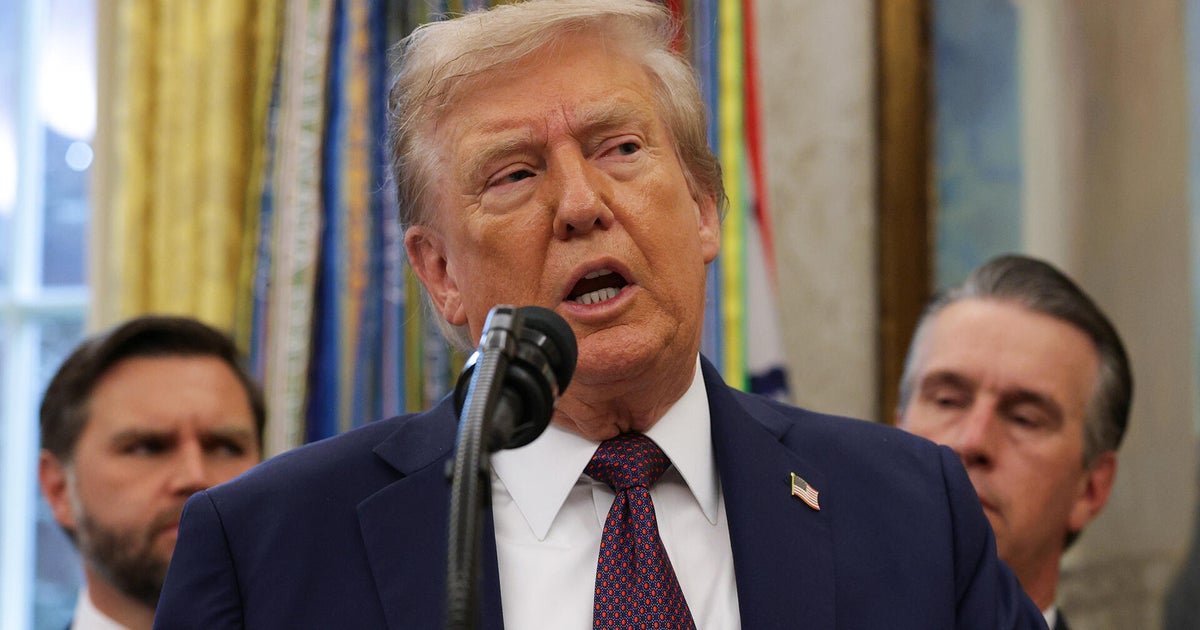

A federal appeals court on Tuesday ruled against President Trump's use of an 18th century wartime law to rapidly deport Venezuelan migrants, finding "no invasion or predatory incursion."
The Trump administration deported hundreds of accused Tren de Aragua gang members earlier this year using the Alien Enemies Act of 1798, an obscure law that allows the president to remove citizens of an enemy country during an "invasion or predatory incursion." Some of those migrants were later flown to a supermax prison in El Salvador — though many of the detainees were sent to Venezuela as part of a prisoner swap in July.
The strategy has drawn a litany of court challenges, many of which argue the U.S. isn't facing an "invasion" or migrants aren't receiving enough due process to contest their deportations. A "60 Minutes" investigation found many migrants sent to El Salvador didn't have criminal records.
Tuesday's ruling by the U.S. Court of Appeals for the Fifth Circuit marks the latest court decision to push back on the Trump administration's use of the Alien Enemies Act. The ruling — which was issued by a three-judge panel, with one dissenter — found the situation with Tren de Aragua does not meet the definition of either an "invasion" or a "predatory incursion."
The Trump administration has argued Tren de Aragua is engaged in an incursion because its members have perpetrated "mass illegal migration." The appeals court rejected this argument.
"A country's encouraging its residents and citizens to enter this country illegally is not the modern-day equivalent of sending an armed, organized force to occupy, to disrupt, or to otherwise harm the United States," the court said. "There is no finding that this mass immigration was an armed, organized force or forces."
The appellate judges granted a preliminary injunction blocking the use of the Alien Enemies Act to remove migrants who sued in the Northern District of Texas. The court said the government can still remove the migrants under other legal authorities.
CBS News has reached out to the White House for comment.
The ruling came in a case that has darted back and forth through the federal judiciary for months, eventually reaching the Supreme Court in the spring.
The case was brought by migrants who were detained in Texas and sued to block their removal under the Alien Enemies Act. The district court did not grant them relief, and the Fifth Circuit said they didn't have jurisdiction to intervene. But the Supreme Court temporarily blocked the migrants' removal in April, and a month later, the high court said the Fifth Circuit was wrong to dismiss the appeal and sent the case back to the appellate court for further review.
The Supreme Court also said the government hadn't given the migrants enough notice of their impending deportations, after they said they were told just 24 hours in advance.
Since then, the government has filed an updated notice that gave migrants seven days' warning of their deportation. The Fifth Circuit said that is likely enough time to satisfy the migrants' right to due process, but sent the issue back to the district court for further review.
The ruling was penned by Judge Leslie Southwick, who was nominated by President George W. Bush. Biden-nominated Judge Irma Carrillo Ramirez concurred with the part of the ruling that said there isn't an "invasion" or "predatory incursion," but said seven days' notice isn't enough.
Judge Andrew Oldham, whom Mr. Trump nominated in his first term, dissented.
"For 227 years, every President of every political party has enjoyed the same broad powers to repel threats to our Nation under the Alien Enemies Act ('AEA'). And from the dawn of our Nation until President Trump took office a second time, courts have never second-guessed the President's invocation of that Act. Not once," he wrote, arguing only the president can decide if the law applies. "For President Trump, however, the rules are different."











-3.png)



